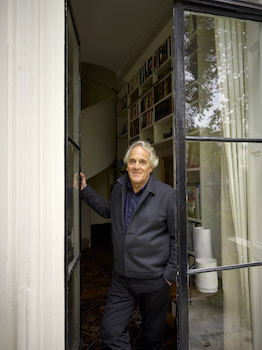Join Henry Porter at his launch event with Toppings, Edinburgh on 14th April. Click HERE
 The idea for The Old Enemy came to me on November 9, 2019 during the weekend celebrations in Berlin to mark the Fall of the Wall. I had covered the story as a 36-year-old journalist and was keen to see what East Berlin was like thirty years on. I hired a cab for the morning and toured all the places I knew well – the boulevards of socialist housing, the huge public plazas and the more secret parts of the GDR, the Stasi headquarters and its prison at Hohenschönhausen. Vast government investment had taken place over three decades and many changes were evident, yet beneath the surface I felt the dismal and dogged spirit of the old Communist East was pretty much intact.
The idea for The Old Enemy came to me on November 9, 2019 during the weekend celebrations in Berlin to mark the Fall of the Wall. I had covered the story as a 36-year-old journalist and was keen to see what East Berlin was like thirty years on. I hired a cab for the morning and toured all the places I knew well – the boulevards of socialist housing, the huge public plazas and the more secret parts of the GDR, the Stasi headquarters and its prison at Hohenschönhausen. Vast government investment had taken place over three decades and many changes were evident, yet beneath the surface I felt the dismal and dogged spirit of the old Communist East was pretty much intact.
And that got me thinking about the generation of young Stasi officers whose careers were nipped in the bud by the revolution of 1989. Where did they go? Did they simply return to civilian life and forget the clandestine skills learned in years of training and indoctrination? Or did they find a way of using them, as so many of their counterparts in Russia did?
Later that day, as I watched the celebrations at the Brandenburg Gate, my story was already forming. What if the Cold War spy hero Robert Harland was invited to Berlin as a guest of the German Government and, at the same time, one of those Stasi officers had discreetly returned from America with a new identity, money and power – an individual who was a recognisable member of American corporate life yet still loyal to the aims of the old regime and its Russian masters?
That weekend, I was staying at the Adlon Hotel where a big commercial event was being held in the conference areas. Through an open door, I glimpsed a most elegantly dressed woman in her mid-sixties. She was surrounded by young businesspeople all paying court to her. She was still beautiful but what was striking was the power and self-possession in her face. I have no idea who she was, but she instantly became the model for my story’s villain, the data-obsessed, former Stasi interrogator, Mila Daus. After a drink, I had the outline and a way of bringing together many of the characters I’ve used over the last 20 years in one big story. I wanted the Cold War warriors, led by Robert Harland, to hand over to two succeeding generations, the middle-aged Paul Samson and Anastasia Christakos and hackers and online investigators in their twenties. Three generations of characters, but the same foe – the old enemy.
Berlin was the genesis, yet the story isn’t about the about the Cold War and it doesn’t take place across the Iron Curtain, but rather in Washington and London, where two political systems have been penetrated by spying networks far more sophisticated and entrenched than ever was the case during 45-year standoff between the east and west during the Twentieth Century.
Russia’s influence is so much greater now. We know about the campaigns of misinformation and destabilisation – strategies formed in the communist era and articulated so well by the Soviet defector Yuri Bezmenov in this interview - https://www.youtube.com/watch?v=zgmg2VFX058 . We know about the devastating hacks, like the Solar Winds attack that took place late last year when the US was consumed by the fate of the only US President who’s actually suspected of being a
Russian asset. And we are grimly familiar with the violent interventions made by Russian government on British soil. The Skripals were attacked with Novichok nerve agent, the FSB officer Alexander Litvinenko was poisoned with plutonium and the oligarch Boris Berezovsky died in highly suspicious circumstances at his home in Berkshire. In all, 14 deaths have been identified by the investigative journalist Heidi Blake as being possible murders by Russian state operatives.
Until recently, very little resource was deployed against Russia by MI5 in the UK. There has been hardly any response by the British government to the various attacks. When there was, as in the Skripal case, Putin used it to boost his majority in the Presidential election. This is as near impunity as the Russian agencies could wish for, and what that suggests to me is that there are almost certainly well-established spy rings operating here and in America and at a much higher level than the famously low-grade network exposed in the States after ten years of investigation by the FBI in 2010.
In February this year, President Putin gave a press conference from his country fastness in which he blamed Russia’s problems on foreign powers sowing discord, a tactic that might well be on his mind at the moment because Russia’s influence in the West these past five years is a thousand times greater than anything the west has inflicted on his country. Western societies are wide open and, because we are no longer on an ideological war footing, it is that much easier for Russia.
The point of The Old Enemy, at one level, is to show that defence of western liberal democracy is handed down from generation to generation. I find that idea rather moving and, although we are going through a bad patch where some politicians and sections the public show the greatest possible desire to be manipulated, our societies are still pretty robust.
The changing of the guard between generations was thrilling to write because I was intrigued to see how old characters like the Bird would interact with the cast from the Firefly series. That sounds a little pretentious but it’s true that if you have spent decades with your characters and you are in lockdown, it’s highly enjoyable to check out of the slightly monotonous reality and see where they take you and of course I’m hooked on the on-off love affair between Paul and Anastasia.
It’s vital for me to know the “terrain” of a novel and experience some of the same things as my characters, which is why in the winter of 2016 I travelled the migrant route into Europe followed my hero Naji Touma. Quite by chance, I’d done all the research I needed for the Old Enemy before lockdown – a visit to the gun range in Pennsylvania to shoot a Nitro Express double-barrelled rifle, time spent in Estonia, Berlin and Leipzig and, for two big set pieces, a tour around the US Congress when I remember thinking – my, this all sure seems vulnerable.

The Old Enemy by Henry Porter
published by Quercus
15th April
Hbk £18.99